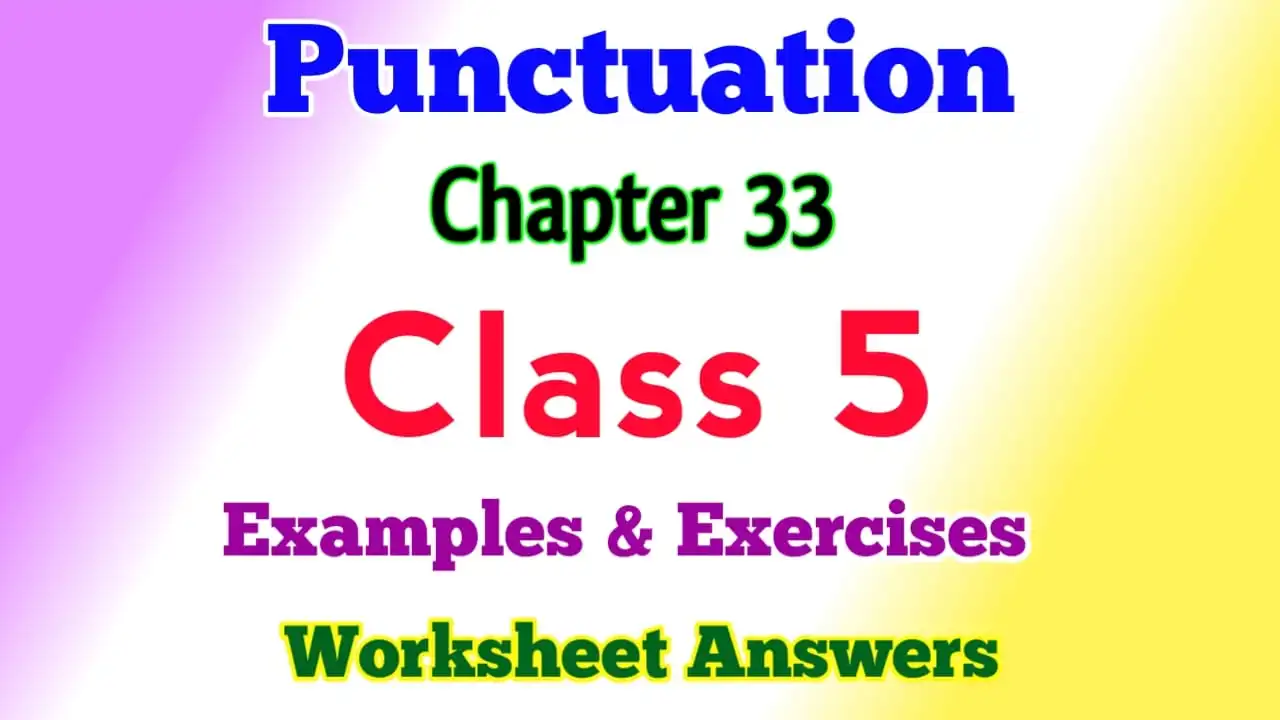Punctuation Class 5 English Grammar has been prepared for learning English Grammar of Class 5 under CBSE, ICSE, and Other State boards as Lesson No 33. Class 5 students in their English Grammar learning process will get help from the Punctuation Class 5 English Grammar to achieve better speaking and writing skills in English.
This Lesson 33, Punctuation Class 5 English Grammar contains – Conjunction Definition, Some common prepositions, Kinds of Prepositions, and Difference Adverb and Preposition with a practice worksheet at the end for better knowledge for class 5.
English Grammar eBook Class 5
About Punctuation Class 5 English Grammar
Capital letters and marks of punctuation make our writing easier to read.
Capital Letters
A capital letter is used
1. to begin a sentence.
Example:
- These children are very noisy,
- He is an engineer.
2. for titles and names of people, places, streets, and buildings.
Example:
- Dr. Arvind Thapa is a consultant at Leeds Hospital in Kolkata.
- The Charminar is close to Laad Bazaar and Mecca Masjid.
3. for the pronoun I.
Example:
- Yesterday, I went to the mall.
4. for titles of works, books, magazines, and films.
Example:
- the Mona Lisa
- the Outlook
- War and Peace
- The Adventures of Tintin.
5. for months of the year and days of the week.
Example:
- Mother’s Day is on the second Sunday of May.
6. for names of festivals and national holidays.
Example:
- Christmas
- New Year’s Eve
- Gandhi Jayanti
- Independence Day
7. for names of rivers, oceans, seas and lakes,
Example:
- the Ganga
- the Indian Ocean
- the Caspian Sea
- the Dal Lake
8. for names of geographical formations, such as mountain ranges, mountains and deserts.
Example:
- Independence Day
- the Himalayas
- Mt Everest
- the Thar Desert
9. for nationalities and nationalities as adjectives.
Example:
- Chinese food
- Italian cheese
- the British
- the French
10. to begin every new line of a poem.
Example:
- If I were Lord of Tartary,
- Myself and me alone,
- My bed should be of ivory.
- Of beaten gold my throne.
Full Stop (.)
A full stop is used:
1. at the end of a declarative sentence and an imperative sentence.
Example:
- The Golden Temple is a holy shrine in Amritsar, Punjab.
- Drive slowly.
Note: We do not use full stops after titles and initials in British English.
Example:
- Dr CV Raman
2. for abbreviations.
Example:
- I will meet you at 10:00 a.m.
Comma (,)
A comma is used
1. to separate words or phrases in a list.
Example:
- Buy a kilo of sugar, a packet of salt, a jar of coffee, a bottle of jam, and a loaf of bread.
Note: p.m. stands for post meridiem meaning ‘after noon’. a.m. stands for ante meridiem meaning ‘before noon’. Ph.D., M.A., B.A., B.Sc, B.Com, M.P.
2. to separate an introductory word or phrase in a sentence.
Example:
- By the way, the picnic has been postponed by a week.
3. after a noun that addresses someone.
Example:
- Rita, please wait here.
4. to separate a question tag from the rest of the sentence.
Example:
- Assam is a beautiful state, isn’t it?
5. between the words spoken by someone and the rest of the sentence.
Example:
- ‘Swimmers with long hair must wear caps,‘ said the coach.
- Sujata cried, ‘Wait for me!’
Question Mark (?)
A question mark is used:
1. at the end of a question.
Example:
- Has anyone seen my geography book?
Exclamation Mark (!)
An exclamation mark is used
1. at the end of an exclamatory sentence.
Example:
- What a charming lady your mother is!
2. after an interjection or a short command.
Example:
- Hurray! We won the match.
- Get out!
Quotation marks (‘…’)
The quotation marks are used
1. to separate the actual words spoken by a person from the rest of the sentence.
Example:
- ‘Your projects must be completed by tomorrow,’ said the teacher.
Apostrophe (‘)
The apostrophe is used
1. to show possession.
Example:
- This is Vikram’s bag.
- My friend’s brother is a pilot.
2. to show missing letters in words.
Example:
- It’s very hot today! (It’s = It is)
- I can’t come tomorrow. (can’t = cannot)
- I’ll go to the bazaar tomorrow evening. (I’ll = I will)
- I’ve got your book today. (I’ve = I have)
Worksheet: Punctuation Class 5 English Grammar
A. Punctuate these sentences correctly using capital letters, full stops, commas, apostrophes, inverted commas, question marks, and exclamation marks.
1. i thought i saw a cat said tweety bird
_________________________________
2. supermans favourite line is up up and away
_________________________________
3. how dare you speak to her like that
_________________________________
4. cricket may be the national sport of england but it is very popular in many other countries as well.
_________________________________
5. on christmas day when jane woke up in the morning she saw a stocking hanging by the side of her bed
_________________________________.
6. when you go to the mall please buy fruits vegetables eggs and butter
_________________________________
7. the soldiers have been living in camps for many months now
_________________________________
8. mr bansal the principal welcomed us on the first day of school
_________________________________
9. the air india flight from london lands in delhi at 11:55 am
_________________________________
10. do you know the name of the smallest country in the world
_________________________________.
11. the mercedes-benz is a very expensive car isn’t it
_________________________________
12. sangeeta is an m a in english from cambridge university
_________________________________
13. which is taller-sears tower or the empire state building
_________________________________
14. wonderful thats very good news
_________________________________
15. the macaw is a large brightly coloured bird found mostly in rainforests
_________________________________
Class 5 English Grammar: All Topics & Chapters????:
Chapter 1. Parts of speech
Chapter 2. The sentence and Types
Chapter 3. Subject and Predicate
Chapter 4. Nouns and their Types
Chapter 5. Noun and Number
Chapter 6. Noun and Gender
Chapter 7. Articles
Chapter 8. Pronouns and their Classifications
Chapter 9. Verbs and Types of Verbs
Chapter 10. Regular Verbs Irregular Verbs List
Chapter 11. Subject and Verb Agreement
Chapter 12. Simple Present Tense
Chapter 13. Present Continuous Tense
Chapter 14. Present Perfect Tense
Chapter 15. Present Perfect Continuous Tense
Chapter 16. Simple Past Tense
Chapter 17. Past Continuous Tense
Chapter 18. Past Perfect Tense
Chapter 19. Past Perfect Continuous Tense
Chapter 20. Simple Future Tense
Chapter 21. Future Continuous Tense
Chapter 22. Future Perfect Tense
Chapter 23. Future Perfect Continuous Tense
Chapter 24. Tense Exercises
Chapter 25. Modal Verbs
Chapter 26. Adjectives and their Types
Chapter 27. Degree of Adjectives
Chapter 28. Adverbs and Comparison
Chapter 29. Prepositions and their Uses
Chapter 30. Conjunctions
Chapter 31. Direct and Indirect Speech
Chapter 32. Transformation of Sentences
Chapter 33. Punctuation







